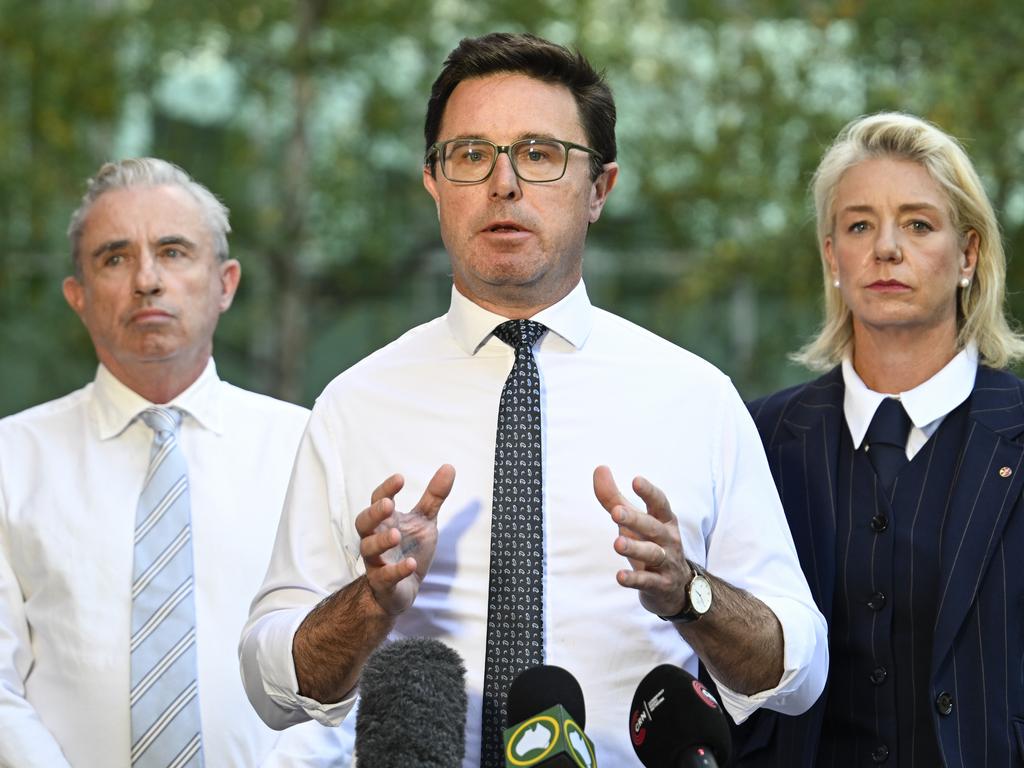Coalition agreement not a ‘foregone conclusion’ amid climate policy rift
Nationals Senate leader Bridget McKenzie says the Coalition agreement with the Liberals should not be considered a ‘foregone conclusion’, as a rift deepens in the junior party over net zero by 2050.

Nationals Senate leader Bridget McKenzie says the Coalition agreement with the Liberals should not be considered a “foregone conclusion”, as a rift deepens in the junior party over the target of net zero emissions by 2050.
Amid mounting expectations the Nationals’ agreement with the Liberals could splinter over climate policy, Senator McKenzie said her party’s commitment to net zero through nuclear power and the Regional Australia Future Fund were “fundamental issues”.
Senator McKenzie declared the May 3 election had handed the Nationals the greatest level of “political influence” since the 1970s, signalling there needed to be a discussion about whether the next opposition Treasury spokesperson should come from the junior party.
While many of her Nationals colleagues have been vocal in criticising the net-zero target, Senator McKenzie said she acknowledged that the climate was changing but the nation needed to balance “keeping jobs here at home and keeping our international commitments”.
“Any Coalition agreement needs to be mutually beneficial to both political parties and it needs to reflect the changing dynamics of our relationship,” she said. “But the reality is, in different states, there have been different models of that relationship, both in Victoria and in Western Australia.
“So I don’t think we should assume an agreement is a foregone conclusion.”
Senator McKenzie’s remarks came as the Institute of Public Affairs released research showing that more than half (58 per cent) of Australians believed the commitment to net zero should be paused unless the energy grid could be reinforced to avoid blackouts.
This belief was more common among men (63 per cent) than women (53 per cent), and was held most strongly among people aged 65 and older (68 per cent).
The survey of 1027 people revealed that 48 per cent of respondents would be unwilling to pay any money out of their own pocket to reach the net-zero target, while 26 per cent were willing to pay $50 a year and 19 per cent $100 a year.
Only 21 per cent of respondents said the net-zero target should be the focus of Australia’s energy policy, with 56 per cent identifying affordability.
IPA deputy executive director Daniel Wild, who ran for the Liberals in the seat of Spence, said Australians had declared that “net zero is dead”.
“That just one in five Australians believe net zero should be the priority of our energy policy demonstrates the total lack of mainstream support,” he said.
As energy policy continued to dominate, Anthony Albanese declared newly appointed Environment Minister Murray Watt would not be rushed into a decision on the future of the North West Shelf liquefied natural gas plant.
After West Australian Premier Roger Cook pressured Senator Watt to make a call, the Prime Minister said WA had spent six years deliberating and he wanted to see approval granted in “accordance with the law”.
Meanwhile, Climate Change and Energy Minister Chris Bowen energised political debate about climate policy after he wrote in The Australian on Wednesday that Labor’s landslide election victory was an endorsement of his rollout of offshore wind farms, renewables and the phasing out of coal-fired power plants. Mr Bowen criticised Sussan Ley for saying the Liberal Party’s commitment to net zero was under review after she won the Liberal leadership.
“If Sussan Ley is saying that’s up for review, I mean, she may as well say the sun coming up tomorrow is up for review, or the sky being blue is up for review,” Mr Bowen said.
Senior Liberal figures told The Australian it was the Morrison government that made offshore wind farms a reality but said they believed Labor selected locations where there was community resentment and resistance.
The Liberals are likely to fall back on their pre-2022 election position where all technologies including nuclear energy are on the table to modernise the power grid rather than amplifying one over the other.
Liberal MPs acknowledge that farmers and major businesses in regional Australia have been early movers on renewable energy to lower costs and be more self-sufficient.
Nationals sources said there was a “50-50” chance the party would step away from the Coalition agreement, with key elements of negotiations with the Liberals being on net zero and the Nationals getting no fewer than seven shadow ministry spots.
Nationals MP Barnaby Joyce criticised Mr Bowen’s assertion that Labor had experienced swings towards its MPs and candidates in seats near offshore wind zones, arguing there had been strong swings against the ALP in his electorate of New England, Flynn and Dawson.
“I do also note another person who got a large swing against him: Chris Bowen,” he said.
Additional reporting: Sarah Ison, Paul Garvey





To join the conversation, please log in. Don't have an account? Register
Join the conversation, you are commenting as Logout